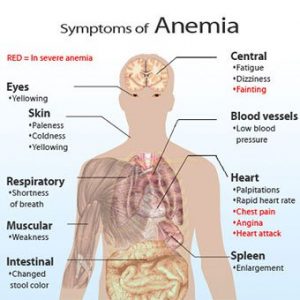Anemia describes the condition in which the number of red blood cells in the blood is low. For this reason, doctors sometimes describe someone with anemia as having a low blood count. A person who has anemia is called anemic.
Symptoms
Anemia signs and symptoms vary depending on the cause of your anemia.

They may include:
- Fatigue
- Weakness
- Pale or yellowish skin
- Irregular heartbeats
- Shortness of breath
- Dizziness or lightheadedness
- Chest pain
- Cold hands and feet
- Headache
Causes
Anemia occurs when your blood doesn’t have enough red blood cells. This can happen if:
- Your body doesn’t make enough red blood cells
- Bleeding causes you to lose red blood cells more quickly than they can be replaced
- Your body destroys red blood cells
Some forms of anemia can have specific symptoms:
- Aplastic anemia: fever, frequent infections, and skin rashes
- Folic acid deficiency anemia: irritability, diarrhea, and a smooth tongue
- Hemolytic anemia: jaundice, dark colored urine, fever, and abdominal pains
- Sickle cell anemia: painful swelling of the feet and hands, fatigue, and jaundice
Risk factors
These factors place you at increased risk of anemia:
- A diet lacking in certain vitamins. Having a diet that is consistently low in iron, vitamin B-12 and folate increases your risk of anemia.
- Intestinal disorders. Having an intestinal disorder that affects the absorption of nutrients in your small intestine — such as Crohn’s disease and celiac disease — puts you at risk of anemia.
- Menstruation. In general, women who haven’t experienced menopause have a greater risk of iron deficiency anemia than do men and postmenopausal women. That’s because menstruation causes the loss of red blood cells.
- Pregnancy. If you’re pregnant and aren’t taking a multivitamin with folic acid, you’re at an increased risk of anemia.
-
Chronic conditions. If you have cancer, kidney failure or another chronic condition, you may be at risk of anemia of chronic disease. These conditions can lead to a shortage of red blood cells.
Slow, chronic blood loss from an ulcer or other source within your body can deplete your body’s store of iron, leading to iron deficiency anemia.
- Family history. If your family has a history of an inherited anemia, such as sickle cell anemia, you also may be at increased risk of the condition.
- Other factors. A history of certain infections, blood diseases and autoimmune disorders, alcoholism, exposure to toxic chemicals, and the use of some medications can affect red blood cell production and lead to anemia.
- Age. People over age 65 are at increased risk of anemia.
Treatment
There is a range of treatment for anemia. They all aim to increase the red blood cell count. This, in turn, increases the amount of oxygen the blood carries.
Treatment will depend on the type and cause of anemia.
- Iron deficiency anemia: Iron supplements or dietary changes. If the condition is due to loss of blood, the bleeding must be found and stopped.
- Vitamin deficiency anemias: Treatments include dietary supplements and B-12 shots.
- Thalassemia: Treatment includes folic acid supplementation, removal of the spleen, and, sometimes, blood transfusions and bone marrow transplants.
- Anemia of chronic disease: This is anemia associated with a serious, chronic underlying condition. There are no specific treatments, and the focus is on the underlying condition.
- Aplastic anemia: The patient will receive blood transfusions or bone marrow transplants.
- Sickle cell anemia: Treatment includes oxygen therapy, pain relief, and intravenous fluids. There may also be antibiotics, folic acid supplements, and blood transfusions. A cancer drug known as Droxia or Hydrea is also used.
- Hemolytic anemias: Patients should avoid medication that may make it worse and they may receive immunosuppressant drugs and treatment for infections. Plasmapheresis, or blood-filtering, might be necessary in some cases






